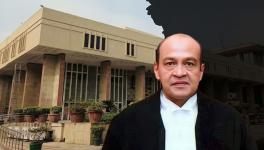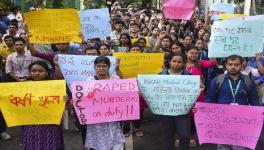Bhima Koregaon: Marking Three Years Since the First Arrest
Recalling the first set of arrests made in the questionable Bhima Koregaon violence case almost exactly three years ago, NIHALSING B. RATHOD, in this first of a three-part series, recollects the personal horrors of trying to track Surendra Gadling in the immediate aftermath of his arrest, details the events leading to the arrest of five more activists in August 2018, and explains how basic tenets of criminal law were violated by the Pune Police in making these arrests.
THE morning of June 6, 2018, gave me a horrific memory that perhaps will never fade. Early in the morning, I received a phone call that police were at the house of Advocate Surendra Gadling again. The memory of the raid of April 17, 2018, was still fresh.
The impending dramatic turn of events was to change the lives of many of us; it was going to expose us to such realities which we had not even dreamt of.
I was always of the opinion that high-profile prisoners always play innocent and falsely blame the police for incorrectly implicating them. Today I stand corrected, and now I am of the opinion that many prisoners do not even get the opportunity to put forth their narrative and bring their perpetrators to books. Sometimes there is smoke without fire, and that smoke comes with a volcanic eruption, destroying lives beyond imagination.
Also read: One year of Bhima-Koregaon case: Part I | History of a 200-year-old battle and why it still matters
Bhima Koregaon arrestees have lost loved ones during imprisonment
In the 1096 days since that fateful morning, it is not even possible to enumerate everything that has happened. Imprisonment, mental and physical losses to their own selves apart, it is hard to imagine the pain of losing their loved ones without being able to see them or give them company.
To list just a few, Sudha Bharadwaj lost her father. Surendra Gadling lost his mother, whereas Sudhir Dhawale lost his brother. Except for Sudha, courts did not find it proper to let them go attend to their bereaved families and mourn the loss with them.
Later, Vernon Gonsalves lost his mother, and Shoma Sen lost her mother-in-law. While these are just family members, Rona Wilson lost his friend Prof. S.A.R. Gilani. Sudhir and Surendra also lost their childhood friend and renowned figure Vira Sathidar, who had also shared a deep bond with Shoma, Mahesh Raut, Sagar Gorkhe, and Ramesh Gaichor. For them, he was far more than a family member.
Mahesh had to telephonically congratulate his only beloved sister on her marriage. These are simply the most obvious travesties that meet the eye: instances when their family members and other loved ones went through the toughest or finest of times, which only exacerbated the excruciating emotional turmoil of being separated from them.
On June 6, 2018, the Pune Police arrested five social activists from across the country. In the days to come, 11 more were to be implicated and placed behind bars. In continuation of raids that were carried out on April 17, 2018, there have been numerous similar raids across the country since then, without any search warrant. Additional Commissioner of Police Shivaji Pawar of the Pune Police carried out the investigation till January 2020, after which it was taken over by the National Investigation Agency (NIA). NIA then made its own contribution to criminal law by summoning hundreds of people on witness summons. Of the witnesses summoned, at least four were arrested and listed as accused.
How Surendra Gadling was arrested
Of them, I was, in a way, witness to the arrest of Surendra. He came to be arrested from his house, without the procedural requirements of being furnished an arrest panchnama or being produced before the nearest magistrate. The human rights lawyer who fought for the rights of detenues was treated with utmost impunity.
By the time I reached the local police station in Nagpur, he had been there for a little over an hour, after which he was moved to a secret location, and we got to know about it only when we met him three days later.
Being a lawyer, he is well versed with the nitty-gritty of the law, so it was expected that the books would be followed scrupulously in his case. More so since he himself had been arguing such violations for many of his clients, and cautious cops would not have preferred to leave any strings loose.
Yet, for him neither the letter nor spirit of the law was followed. Neither his wife nor his family members were given any disclosure of his arrest. They were never told about the reasons for his arrest, where he would be produced, under which crime he had been taken away, which is the investigating agency, or if the arrest was under any warrant or without a warrant.
Knowing that it would not be of any help to argue with low-ranking police officers working on commands of their superiors, they were left with no alternative but to submit to suffer.
After being taken to the local police station, Surendra was secretively taken to Amravati, a town about 150 km from Nagpur. The Pune Police produced him before the Magistrate there, seeking his transit remand. Surendra argued himself, telling the judge that he is not the nearest magistrate in any sense and cannot authorise his detention. The Magistrate refused to pass any order and rejected remand.
Later, he was brought back, and taken to Pune by flight late at night. In Pune, a special judge sat at 6 a.m. for granting remand on June 7, 2018. At this early hour in the morning, a legal aid lawyer was present to appear for Surendra, even when he protested and expressed his desire to argue his case himself, and the lawyer’s vakalatnama was accepted.
Brushing aside all the lapses, his detention was authorised by the special judge. We, later on, learnt that the judge was never designated as a special judge under the NIA Act, 2008, and still exercised powers to grant remand for not just Surendra but to all those who were arrested in the days to come.
Habeas corpus petition made to Nagpur bench of Bombay High Court
While all this was going on and Surendra’s whereabouts were not known to the public, his wife filed a habeas corpus petition before the Nagpur Bench of the Bombay High Court.
I appeared for seeking urgent hearing of the matter, and appealed, “A prominent human rights lawyer practicing for years before this court has been taken away by the police without following any of the mandatory processes and we do not know his whereabouts…” The Bench asked, “Who?” I replied, “Advocate Surendra Gadling”. The bench responded, “Must have been arrested, no urgency, not today”. I retorted, “But my Lords, I [that is, the petitioner] am entitled to know about the whereabouts and wellbeing of my husband. How can anyone be arrested without following the process? My fundamental rights are involved, this is abduction!” After deliberating for a moment, the bench replied, “Alright, tomorrow”. I attempted again, “But it is habeas corpus”, but the bench simply stated, “Whatever it be, tomorrow”.
In the hearings thereafter, the court opined that since the action was taken by the Pune Police, the matter could be heard and decided only by the Mumbai bench of the High Court. We pleaded that at least we are told where he has been taken to and that his wife should be allowed to speak to him over the phone.
The bench looked at the ‘police prosecutor’ who also happened to know Surendra personally; he said he had no instructions on the matter, and could not help without orders of the court.
Ultimately, the petition had to be withdrawn, for the bench successfully convinced us that transferring the matter to Mumbai would take a long time, and it will be faster if the petition is filed there directly.
Other arrests made on June 6
On June 6 itself, news of the arrest of various persons from across the country started to come in, sending shock waves. While we attempting to locate Surendra, we also got the news that a police team was conducting a raid at the house of Prof. Shoma Sen, who was to retire soon from her long stint with Nagpur University as a Head of the English Department. Sudhir Dhawale from Mumbai came to be arrested in a similar fashion, but here at least intimation of his arrest in writing was given to his friend.
It was only the next morning that the dust settled and we knew got wind that in all, five had been arrested. Mahesh Raut was also arrested from Nagpur itself after a raid was conducted at his house located far away in another district. Meanwhile, Rona Wilson was arrested by the Pune Police at Munirka in Delhi
Except for Mahesh, no one was produced before the nearest magistrate. No one was allowed to avail legal aid of their choice. The special court which had held a special sitting to remand Surendra during the day remanded the remaining four to police custody.
Pune Police’s malicious character assassination of the arrestees
While we were trying to recover from the shock of these arrests, the Pune Police held a press conference making sensational revelations including a plan of these social workers to assassinate the Prime Minister himself.
This mischievous press briefing had its obvious impact. It scared many sympathisers. The image that the common man had about the arrestees got tainted, and people at large started harbouring negative feelings about them. How could they know that the cops were playing dirty politics to suppress those working for their well-being, and their voices!
Thereafter, police officers Parambir Singh, Rashmi Shukla, and Shivaji Pawar held multiple media briefings, giving away many documents which they claimed were email conversations, and later clarified that those were retrieved from the hard discs of these people. These documents, though they did not inspire any faith, had made enough impact to create the public sentiment necessary to justify their arbitrary arrest and suppress any outrage. Little did we know that it would take two long years to obtain copies of these hard discs and have them examined by a digital forensic expert company, which confirmed that all these documents were planted by using spyware called ‘netwire’.
Intimidation of lawyers by the Pune Police
However, the time these five spent in police custody and the hearings that took place at the Pune court were designed to be as traumatic as possible for the near and dear ones of the arrestees. After the arrest, we, with the court’s permission, had gone to meet Mahesh Raut and Shoma Sen in police custody, being lawyers. There we saw the police officer Suhas Bawache occupying the chair of Investigating Officer Shivaji Pawar. Although he was part of almost all the actions that the Pune Police took, his name appears nowhere on records.
In that tense situation in which we were trying to know about the wellbeing of Mahesh Raut, he gave us a thinly veiled threat: “Don’t pull up our names, don’t target us or else we will also have to take care of you all!”, he said, staring at me.
He had similarly threatened Surendra when he was prosecuting Prof G. N. Saibaba and Surendra was defending him. He had then said, “After him (Prof Saibaba), you (Surendra) shall be next”. I got so frightened that at the very first opportunity that I got, I fled the police station, and locked myself in my hotel room.
The night was filled with nightmares. Later, similar threats were given by Shivaji Pawar to another lawyer Jagdish Meshram, by making a passing comment to Mahesh that he will ensure that all his friends (lawyers) are kept with him in prison.
Also read: BHIMA KOREGAON PART IV
Defamation of other activists by TV news media
Sudha Bharadwaj, who came out loud and strong in support of these activists, was vindictively attacked by Republic TV and other select media channels. A document, now proven to be planted, came to be attributed to her authorship. A number of people were slandered on live TV shows. Flashing some part of one of the letters, I was called a “Naxal courrier, ready to take more risk”. They flashed my name in big and bold letters, along with those of many others.
The planted letter, which was drafted without conducting proper research, contained some names which did not even exist or were of such persons who happened to be mere acquaintances and were nowhere related to the Indian Association of Peoples’ Lawyers. Their names flashing on TV, and being called Maoist operatives terrorised them to the core.
Five more activists arrested in August 28, 2018
Sudha issued a notice to Republic TV. Before she could process her suit for defamation, she was arrested on August 28, 2018. The same day, Gautam Navlakha, Varavara Rao, Arun Ferreira, Vernon Gonsalves, Anand Teltumbde and Father Stan Swami were raided. Apart from Anand and Father Stan, the rest were arrested.
However, in a path-breaking order, the Delhi High Court directed to place Gautam Navalkha on house arrest, which was to set a precedence of its own kind in the days to come.
Romila Thapar approached the Supreme Court seeking its intervention and an independent probe in the matter, wherein the apex court directed to place all five under house arrest. Later on, it delivered a split verdict dismissing the petition, with Justice D. Y. Chandrachud dissenting.
(Nihalsing B Rathod is a lawyer based in Nagpur. This is Part I. Two more parts follow. The views expressed are personal.)
Get the latest reports & analysis with people's perspective on Protests, movements & deep analytical videos, discussions of the current affairs in your Telegram app. Subscribe to NewsClick's Telegram channel & get Real-Time updates on stories, as they get published on our website.
























